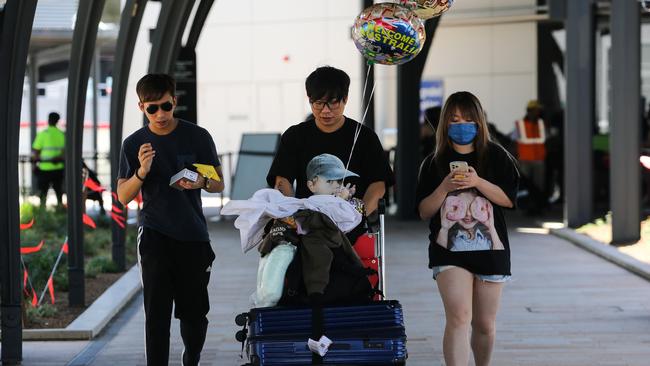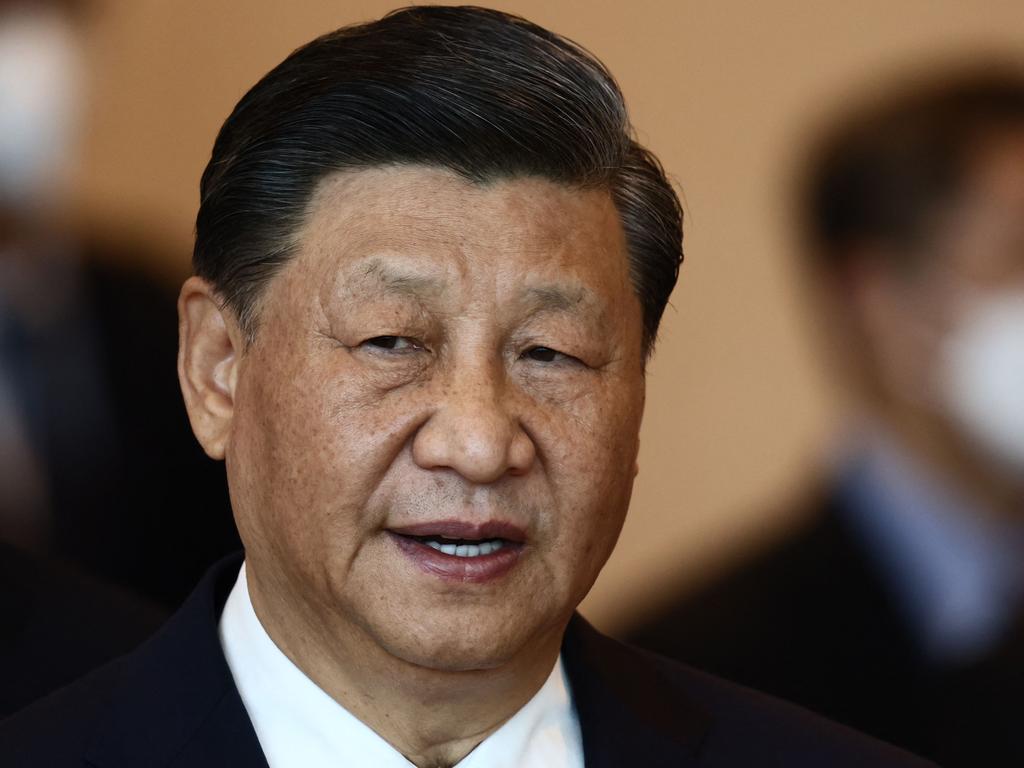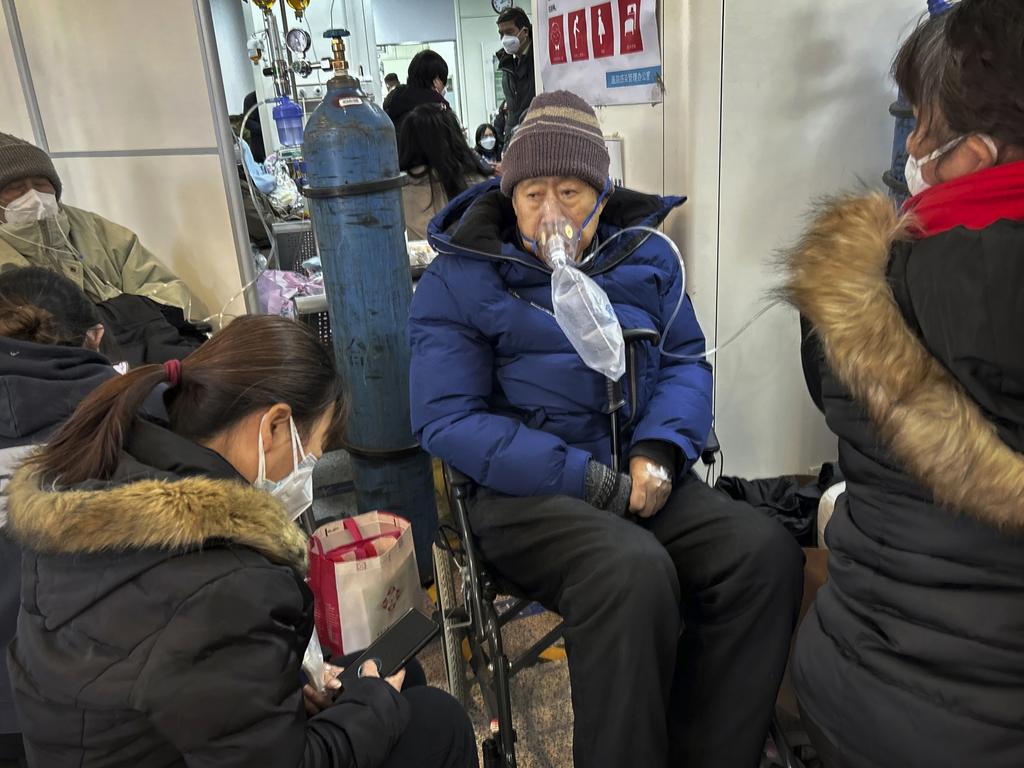China threatens payback over new Covid measures
Beijing has warned it will retaliate against nations that have imposed ‘discriminatory’ Covid-19 testing requirements on travellers leaving China, arguing the policy is political and lacks a scientific basis.

China has warned it will retaliate against nations that have imposed “discriminatory” Covid-19 testing requirements on travellers leaving the communist nation, arguing the policy is political and lacks a scientific basis.
The warning from Beijing comes as Peter Dutton accused Anthony Albanese of mishandling the response to China’s Covid-19 outbreak while key industry groups stand by new requirements despite the shake-up not being recommended by official health advice.
“Some countries adopt entry restriction measures only targeting China, which lacks a scientific basis,” Chinese foreign ministry spokeswoman Mao Ning said in Beijing on Tuesday night.
“We firmly oppose the practice of manipulating epidemic prevention and control measures to achieve political goals, and will take corresponding measures according to the principle of reciprocity according to different situations.
“New strains can emerge anywhere, so there is no need for special entry restrictions on China.
“China always believes that the epidemic prevention measures of various countries should be scientific and appropriate, and should not take the opportunity to engage in political manipulation, discriminatory practices, and normal personnel exchanges, exchanges and co-operation should not be affected.”
Australia on Sunday joined more than a dozen nations including the US, Britain, India and Japan, to require the screening of travellers entering from China over concern about a lack of transparency of data that would indicate the emergence of new strains of Covid.
The Opposition Leader said on Tuesday there was “chaos and confusion” within the government over the handling of Chinese arrivals after Health Minister Mark Butler rebuffed advice from Chief Medical Officer Paul Kelly that found no new testing requirements were needed.
Extra information released by the government on Tuesday clarified that travellers to Australia from China – including Hong Kong and Macau – could use a rapid antigen test to prove they were free from Covid, but the testing would have to be administered or supervised by a medical practitioner.
Under the new rules, which take effect from Thursday, a negative test must be returned 48 hours before departure, with the exception of airline crew, children under 12 and those with evidence they have contracted Covid-19 in the past 30 days and are no longer infectious.
More stringent requirements will apply to passengers using RATs than those taking PCR tests.
“If a RAT test is used, a certificate from the medical practitioner administering, or supervising, the test will be required,” the new information said.
“This certificate should include: the date and time of the test; the name of the individual tested; the type of test conducted; the brand and make of the test; that the specimen for the test was collected, and the test was carried out, by or under the supervision of a medical practitioner; the result of the test; the signature of the medical practitioner providing the certificate.”
Australian citizens returning from China will also need to comply with the new measures.
Demanding an explanation from the Prime Minister as to why the measure had been introduced, given the government had advised there was “no new variant of concern coming out of China”, Mr Dutton warned against a “panicked response” to the unfolding Covid-19 wave in China.
“In the absence of Australian health advice to put the restrictions in place, the Prime Minister must justify why he has deviated from what has been previously agreed,” he said in a joint statement with opposition health spokeswoman Anne Ruston. “The most relevant health advice for Australians is our Chief Medical Officer’s advice, as it considers all factors in the context of our nation’s health and economic position.
“The last thing our country needs is a panicked response from a government that doesn’t have a plan and, frankly, over the last week, has been making it up as they go along.
“Chinese Australians want to return home after their holidays and need more certainty in their travel plans. It disrupts families and businesses when the economy is souring under the Albanese government.”
Jim Chalmers conceded the government’s policy was not based on Dr Kelly’s advice.
“I think it’s pretty clear from what’s been published, that the CMO in making the point that we need to get our surveillance efforts up, was not proposing this exact course of action,” the Treasurer said. “But we’ve been pretty clear that we take decisions that we think are in the best interest of the country, again, out of an abundance of caution, again, consistent with what a lot of other countries are doing.”
Infectious diseases expert Peter Collignon said allowing RATs to prove someone was free from Covid-19 showed the screening of Chinese travellers was pointless.
“RAT tests seem to have poorer performance with Omicron than previously, plus often only positive two days later than PCR tests,” Professor Collignon said.
“Likely RATs will miss as many infections as they pick up. So why are we bothering to do this at all? Just pain for (travellers) with little or no gain.”
While industry groups and state Labor governments supported the screening requirements on Sunday on the basis of “health advice”, there was little opposition aired on Wednesday after it emerged the measure was not recommended by Dr Kelly.
Australian Chamber of Commerce and Industry chief executive Andrew McKellar said he accepted the government’s decision. “Our response hasn’t changed,” he said.
The major bodies representing the university sector – Go8 and Universities Australia – also remained supportive.
“Given increasing international concern regarding managing Covid-19 variants, the government’s precautionary and temporary arrangements are reasonable,” Go8 deputy chief executive Matthew Brown said.
Universities Australia chief executive Catriona Jackson said the sector would be watching “very carefully what Mark Butler says about how he reached that position”.
“What’s really important here is this is not an impediment to Chinese students returning to Australia. It just means they need to have a test before they get on that aeroplane,” she said.
The Business Council of Australia and Master Builders Australia stood by their previous calls for the measure not to precipitate a new era of restrictions.
West Australian Premier Mark McGowan remained supportive of the measure, while a spokesman for the Queensland government said: “As this is a federal matter, it would be inappropriate for us to respond.”







To join the conversation, please log in. Don't have an account? Register
Join the conversation, you are commenting as Logout